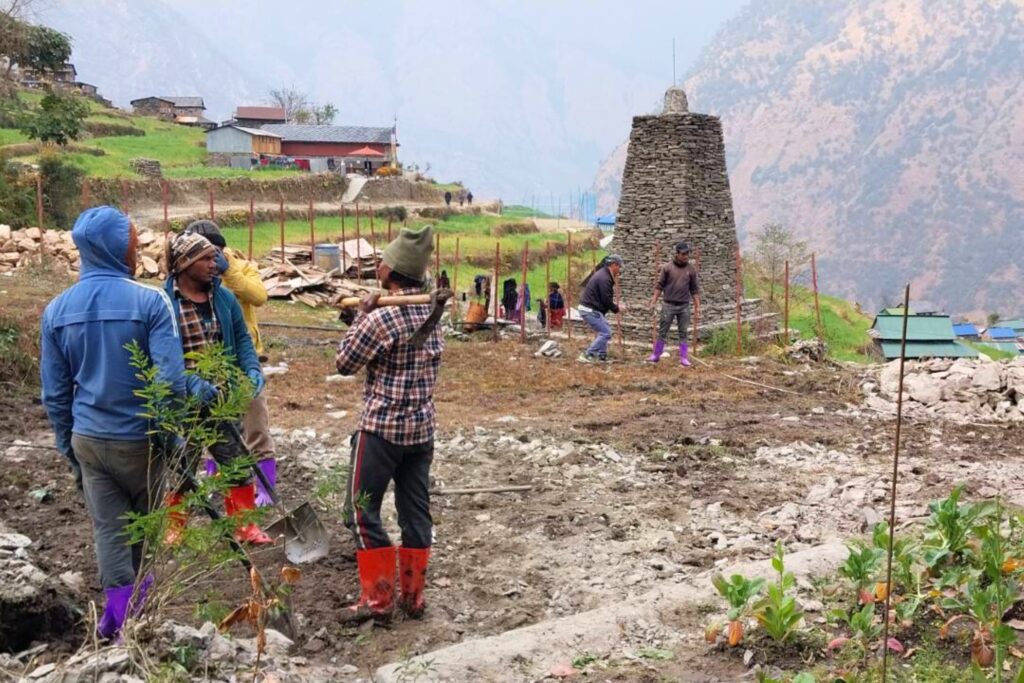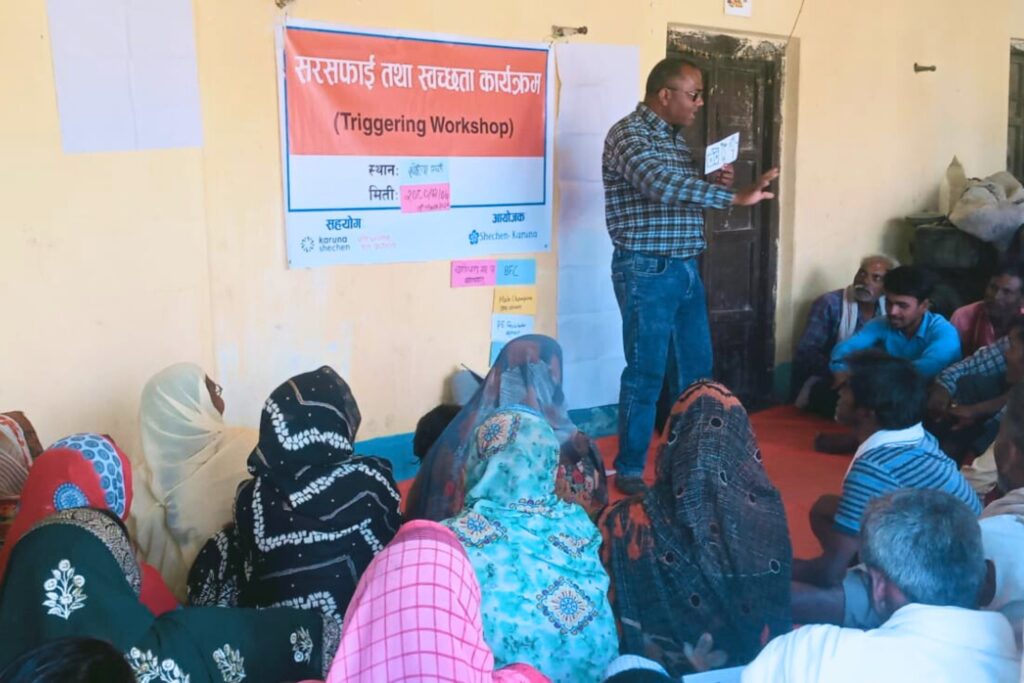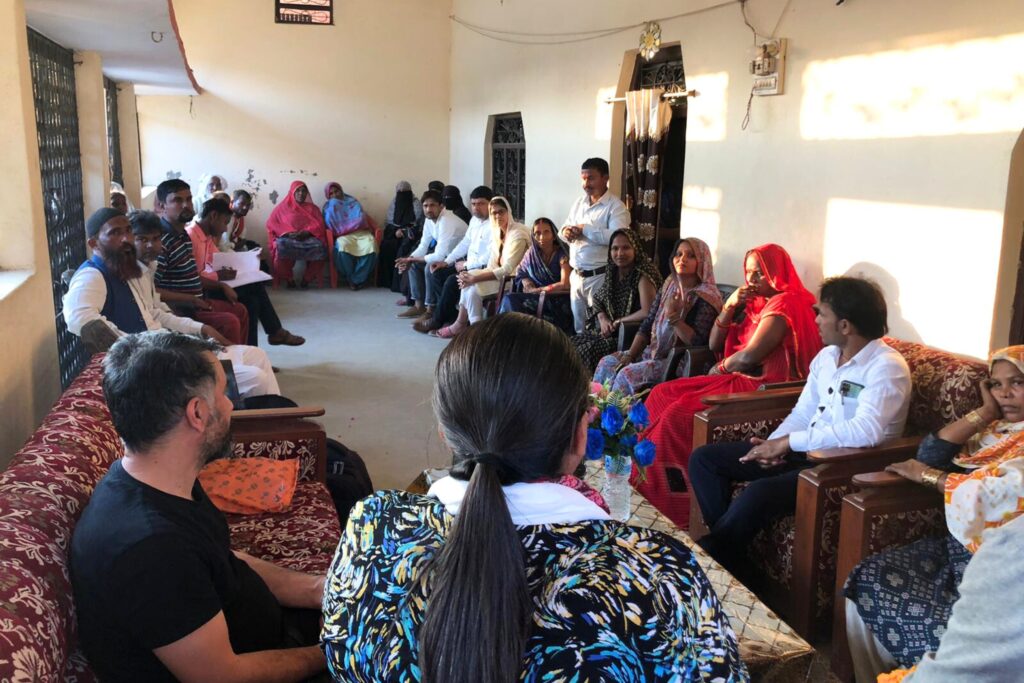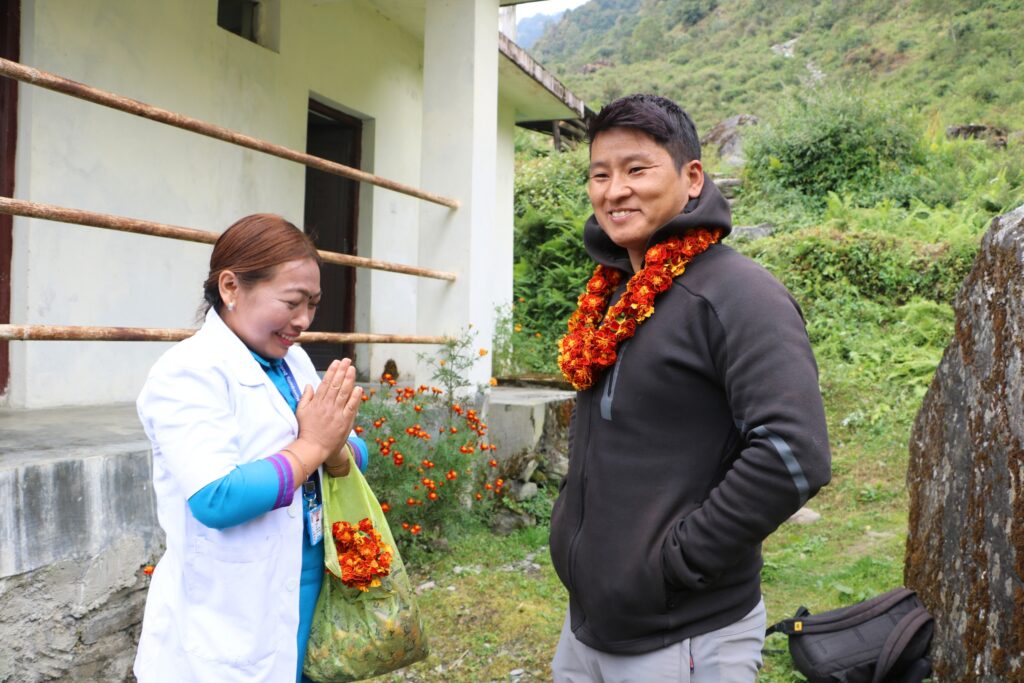At Karuna-Shechen, we firmly believe that cooperation is essential to create a sustainable impact. Working together with different stakeholders helps to overcome local challenges, build capacity and ensure that our projects meet people’s real needs. This collaborative approach is one of the pillars of our intervention model.
Multiparty cooperation
Collaboration between Karuna-Shechen, local authorities and communities is key to the success of our projects. Each group plays a complementary and necessary role in achieving the objectives we set together. In this way, the projects are adapted as closely as possible to local realities and are viable in the long term.
For each program we build sincere and respectful relationships with local authorities and communities. Through this inclusive approach, everyone feels involved and recognized in their role.
Baikantha Lal Pahadi, president of the 5th constituency of Sindhuli, shares his feelings: “Our collaboration with Karuna Shechen is built on mutual understanding and close coordination. This partnership enables us to identify priorities and implement solutions together, ensuring the long-term success of these initiatives. I am deeply grateful for their unwavering support.”
This partnership enables us to identify priorities and implement solutions together, ensuring the long-term success of these initiatives. I am deeply grateful for their unwavering support.
Baikantha Lal Pahadi, president of the 5th constituency of Sindhuli, Nepal

This process was fundamental to the construction of a health post in the Ruby Valley. The local government made a financial contribution, members of the community provided logistical support, and Karuna-Shechen took charge of the technical design and implementation. This type of collaboration makes it possible to create a sustainable infrastructure that is perfectly adapted to local needs and designed to last.
Multiparty cooperation is not a rigid process, but rather a flexible model that can be adapted to specific contexts. Each community and region has its own challenges in terms of access to resources, social dynamics and cultural traditions.
Working with local authorities
Key partners for a sustainable impact
Local authorities are essential partners in ensuring that projects are implemented. Their knowledge of the local context, their network of influence and their ability to mobilize the community are major assets.
As intermediaries between the government and local populations, they play an essential role in validating projects and mobilizing the necessary resources. They also ensure that projects are aligned with local and regional priorities.
Phe Dorje Tamang, Chairman of the Ruby Valley 3rd constituency, underlines the strength of this partnership: “Karuna’s close collaboration with the authorities ensures that the projects make effective use of local resources. This inclusive approach, particularly in the area of agricultural training, has significantly benefited our farmers and ensured the long-term success of their practices”.
Actors for local change
Mobilizers play an essential role in the success of Karuna-Shechen projects, acting as bridges between local authorities and communities. Employed by local governments and trained by Karuna, these people are at the heart of program implementation.
For example, Female Community Health Volunteers (FCHV) relay health information and facilitate access to healthcare in remote areas. They ensure that health messages reach the most isolated families.
Water, Sanitation and Hygiene (WASH) mobilisers focus on promoting hygiene and sanitation practices. Their training enables them to raise community awareness of specific actions such as building toilets and adopting good sanitation practices.

Ram Bahadur, WASH mobiliser in the Dhading district, explains: “Karuna-Shechen has provided us with essential training on water, sanitation and hygiene, best sanitary practices and maternal health. Open defecation is a major problem in our community, so this training is crucial. Today, I pass on this knowledge myself, independently, to members of the community through gatherings and monitoring visits. There is now a real sense of responsibility and collective effort within our villages. By working together, our village is moving in the right direction.”
Involving local communities: essential cooperation
Active collaboration with local communities is at the heart of our approach. Our experience over 25 years of solidarity shows that the most successful projects are those that are supported, led and carried out by the people themselves.
Better Future Councils: An example of community involvement

Better Future Councils (BFC) are an example of this successful initiative. These councils enable members of the community to come together, discuss local priorities and develop solutions together. This model strengthens the social fabric and ensures that projects have a solid and lasting foundation.
Sita Devi, a member of the Better Future Council in the village of Khandbari, shares her experience: “Before the Better Future Council was set up, we didn’t have a platform for discussing the challenges we faced together. Today, thanks to this initiative, we are more united and able to find solutions tailored to our needs.”
A model of successful cooperation
Collaboration with local stakeholders was a key factor in the success of the eye screening camp in Ruby Valley.
Raj Bahadur Tamang, health coordinator for the rural municipality, played a key role in the organization by mobilizing human resources and actively involving Female Community Health Volunteers (FCHVs). Through their awareness-raising efforts, the FCHVs came into contact with the local population, responded to their concerns and encouraged them to access the camp’s services.

Ram Singh Tamang, Chairman of the Rural Municipality of Ruby Valley, comments: “This close collaboration, in which we share responsibilities and resources, has strengthened our community. We look forward to continuing fruitful partnerships in the years to come.”
The synergy between the local authorities and Karuna-Shechen demonstrates how joint efforts can effectively respond to community needs while strengthening links between stakeholders.
The sustainable impact of our projects is based on solid, ongoing multi party cooperation. By working together with local authorities and communities, we create solutions that are appropriate, sustainable and deeply rooted in local realities. Each participant contributes to building a better and fairer future. Together, we can ensure that our projects continue to transform lives well beyond their initial implementation.
